- Home
- Sherryl Woods
Island Storms
Island Storms Read online
Previously published as Hot Property, the first installment of the Molly DeWitt Mysteries by #1 New York Times Bestselling Author Sherryl Woods is an engaging fan favorite that you don’t want to miss!
Finding a corpse in the card room of her elegant new Key Biscayne apartment complex was not what Molly DeWitt had in mind for a fresh new start—especially when the knife in the dead Ocean Manor’s president’s back appears to be her own. But when charming homicide detective Michael O’Hara decides to get on her case, it’s up to Molly to track down the real killer and clear her name.
Island Storms
Sherryl Woods
CONTENTS
Chapter 1
Chapter 2
Chapter 3
Chapter 4
Chapter 5
Chapter 6
Chapter 7
Chapter 8
Chapter 9
Chapter 10
Chapter 11
Chapter 12
Chapter 13
Chapter 14
Chapter 15
Chapter 16
Chapter 17
Chapter 18
Chapter 19
CHAPTER 1
Key Biscayne, Florida
1992
Discovering a corpse first thing in the morning shot the hell out of Molly DeWitt’s plans for getting to the office early. Outside the condominium’s wall-to-wall sliding glass doors, wispy clouds scudded across a near-perfect spring sky. Faced with death, Molly had the irrational feeling that those clouds should have had the decency to shade the sun. Instead the unrelenting light streamed into the Ocean Manor cardroom, illuminating the murdered man in a macabre spotlight. She stood frozen in the doorway, her gaze fastened on the glistening serrated knife sticking out of Allan Winecroft’s back. The bloodstain surrounding it had absolutely ruined his designer polo shirt, which had once been the golden color of melted butter. It now looked as if it had been tie-dyed.
Swallowing hard and staring at the mess, Molly thought about all those new condominium rules legislating absolute tidiness in all of the public areas. Allan Winecroft had drafted every one of them. Little had he known that he was about to become the rules’ worst offender. The irony of that didn’t escape her. In fact, that little glimmer of gallows humor was about the only thing keeping her from screaming her head off, not so much in fear as in frustration. She was really getting tired of murders, especially in her own backyard.
Less than six months earlier Molly had sold her lovely Spanish-style house in an older bayside section of Miami because of the burglaries and because a Colombian drug dealer had been shot to death under the corner streetlamp just outside her door. She’d been watching the news at the time.
It had been a fairly routine news night, actually. There had been another home invasion robbery in Fort Lauderdale and another record haul of cocaine discovered on a decrepit fishing boat in the Miami River. More AIDS-infected needles had been found near a school playground. The sound of shots had sent Molly diving for the floor. When her knees hit the tile, she’d spent about ten seconds cursing at the pain, then reached for the phone and called a real estate agent. She’d figured someone else could summon the police.
The minute a deal for the house had been struck she’d begun looking for someplace safe for herself and her eight-year-old son. The thought of leaving South Florida had never once occurred to her, only getting away from that jinxed house where even her marriage at the end had been almost criminal in its polite emptiness. Beyond that, though, she loved Miami’s ethnic diversity, its vibrancy, even its conflicts. There was a passionate undercurrent here that either invaded the soul or robbed you blind. She wanted the passion, but was determined to minimize the danger. How many TVs and stereos and VCRs could she be expected to replace in one lifetime anyway?
In practically no time at all, she had chosen Key Biscayne. Not only was the island beautiful, but more important it was a relatively safe haven compared to Miami. Bumper stickers, faded navy blue with yellow lettering, proclaimed it PARADISE FOUND. Like all bumper sticker philosophy, the phrase held more than a grain of truth.
Only a fifteen-minute drive from downtown Miami, Key Biscayne was a world apart in attitude. The old-timers on the island, in fact, were still bemoaning the loss of the drawbridge. That bridge had intimidated most criminals. They had stayed away for fear of being caught on the wrong side with police on their heels and a yawning emptiness over Biscayne Bay ahead of them. Now an almost blinding white span climbed into the sky and curved down again, providing three lanes of clear sailing back to the mainland. The new bridge had provided easier access for developers, beachgoers, and criminals alike.
It also made Key Biscayne convenient to Molly’s job. The Miami/Dade Film Commission office, which had inexplicably been made part of the parks department, was housed in the old gatehouse of the famed Vizcaya estate, practically at the end of the Rickenbacker Causeway. She could be there in exactly twelve minutes, ten if she ignored the forty-five-mile-an-hour speed limit the way everyone else did.
Having decided on Key Biscayne, Molly chose Ocean Manor partly because of its view of the Atlantic and mostly because it had beepers and Medco security keys for every entrance, plus guards at the gate, guards at the door, and a security chief who was a former Nicaraguan freedom fighter with a nasty, intimidating scar on his cheek.
Too bad one of those guards hadn’t been on duty in the cardroom last night.
Although Molly was tempted to sneak right back into the elevator and pretend she’d never left her apartment, her conscience wouldn’t let her. Perhaps it had something to do with the fact that the murder weapon happened to have come from her own kitchen. She recalled the last time she’d seen the knife. Drucilla Winecroft, the dead man’s wife, had been using it to slice the frosted double fudge cake served following last night’s heated bridge competition. The couple had lost.
Molly felt it was probably important to point out that the Winecrofts were avid bridge players. She wasn’t. In fact, she was barely adequate, with bidding skills more suited to an auction than a bridge table. She had agreed at the last minute to substitute for an ailing neighbor. Within minutes she had vowed never again to be trapped into playing opposite the competitive pair. Their constant bickering over strategy throughout the evening had set her nerves on edge. If the game had gone on much longer, Molly might have been tempted to kill both of them herself. Even so, it was impossible to imagine that Drucilla had been so irate after the defeat that she’d stabbed her husband in retribution for the crummy bid he’d made in the final hand.
Attuned to the crackling tension between the couple, Molly had been very careful not to gloat as she’d laid her winning trump card—a paltry deuce—on the table. She hadn’t stuck around for the debate over who the real dummy had been or for her serving of cake.
Perhaps she should have stayed, she thought as she stared at the dead man. Perhaps if she’d lingered long enough, the murder weapon would have been washed and dried and back in her kitchen where it belonged instead of stuck between the shoulder blades of the controversial president of the Ocean Manor condominium association. She didn’t envy the person who had to come up with a list of suspects. Allan was hated equally by everyone except the tight coalition of residents who’d maneuvered him into office. Some suggested the election had been about as valid and free of ballot-box stuffing as those held in many reluctantly democratic Third World countries.
Without moving an inch farther into the room, Molly glanced around. There was no sign of a struggle. Not so much as a rattan chair or a chintz-covered cushion was out of place at any of the half-dozen card tables. Someone had w
iped off the Formica-topped bar, clearing away the remnants of the bridge game refreshments. Even the trash can had been emptied of paper plates and cups. She had to assume the players had done all that before leaving the previous night, probably at Allan’s insistence. If it had been left to the cleaning staff, and they had been in this morning to tidy up, surely they would have mentioned the body. The manager was a stickler for discretion, but even he would expect them to acknowledge a dead man. Besides, there were a few cashews ground into the pale-peach carpet, which meant no one had been in to vacuum.
Molly wished she’d paid more attention to those college lessons in deductive reasoning. Since he was still wearing the same clothes he’d had on the previous night, the only conclusion she could reach was that Allan Winecroft had been killed after the games ended and all the card players except the killer had gone back to their own apartments. Unless they’d all stood around and watched, which she doubted. Most of them liked to be in bed by midnight, so they could make their 8:00 a.m. tennis games or tee times. In fact, someone was probably pacing the marble-floored lobby in pricey sneakers right this minute waiting for Allan to show up.
Molly knew enough about crime scenes and murder investigations—mostly from TV and film scripts—to guess that this was going to be a very long morning. Steadying herself, she walked to the security desk in the lobby and announced…nothing. She couldn’t seem to squeak out so much as a single word. Dead or murder would have been sufficient, but she had to settle for pointing down the hall. Apparently she looked convincingly desperate. Security Chief Nestor Perez hefted his dark-green pants over his pot belly and ambled off in the right direction. Within minutes she heard the excited babble of Spanish over his walkie-talkie. Guards suddenly appeared from every which way, running now. Lord knew who was left to open the gate for the police, who she devoutly hoped would be arriving at any minute.
When Nestor returned, he spewed what sounded like a barrage of questions at her. Molly stared at him blankly. It wasn’t that she was still speechless. It was simply that her understanding of Spanish failed her when the words came at her too fast.
“Despacio, por favor,” she pleaded, sinking onto the bright chintz cushions of the lobby sofa. “Slowly.”
“Sí, sí,” he promised, his head bobbing. “¿Qué pasa?” He gestured wildly toward the cardroom.
Molly shook her head. “I have no idea what happened. When I left last night, everyone was eating cake. My cake, as a matter of fact. It was double fudge, from some Junior League cookbook my mother gave me as a wedding present. I baked it after work. I promised Brian a slice to take to school, but I forgot to take the leftovers upstairs. I ran down this morning to get them to put in his lunch box, but it was too late. I guess it was too late. Actually I forgot all about looking for the cake, once I saw the body. Allan is dead, isn’t he?”
Nestor’s expression grew increasingly puzzled as she babbled on and on, uncharacteristically unable to form a simple declarative sentence.
“¿Qué?” he said finally. The scar on his face was drawn tight.
Molly sighed and shortened her response. “I don’t know what happened.”
He patted her hand, the gesture awkward but sympathetic. The scar curved with his smile like an elongated dimple. “Is okay, Mrs. DeWitt. Police come soon.”
He sounded almost as relieved by the prospect as she was. “God, I hope so,” she said fervently.
Nestor left her to her prayers and headed back to the action down the hall.
“Hey, Mom! Are you down here?”
Molly recognized her son’s voice and jumped up, racing toward the cardroom. The thought of Brian stumbling across Allan Winecroft’s body panicked her. He’d probably be traumatized for life. She’d spent days thanking God that he’d been with his father the night of the murder outside their former home. She drew in a deep breath now, preparing herself to deal with his shock. He saw her coming and ran to meet her. He skidded to a halt on the marble floor, a freckle-faced kid with a gap-toothed smile and blue eyes sparkling with excitement. He looked anything but traumatized.
“Hey, Mom, did you know there’s a dead man in the cardroom? Who is it? Can I see? Juan and Nestor said I had to ask you. So can I? I never saw a dead guy before.”
Molly winced. When had her child become so bloodthirsty? Was it cartoons or the evening news that had done it? Or maybe Nestor’s endless reminiscences about the violence of the revolution back home? He was particularly proud of a couple of bloody ambushes he’d led.
“No, you may not see,” she said firmly.
Brian obviously took the denial as nothing more than a minor setback. “What happened? Did he have a heart attack? There are a lot of old guys around here. I’ll bet that’s it. He had a heart attack, right?”
“No.” Molly wondered exactly what the psychology textbooks had to say about explaining murdered neighbors to an eight-year-old. The textbooks probably couldn’t help with a kid like Brian. He was precocious and wise beyond his years, his IQ in a range that intimidated the daylights out of her. Witness the fact that at the moment he was far more curious than scared. Maybe you had to be thirty to be shaken. Not that she was that old, but she’d been trying the age on for size ever since her twenty-ninth birthday. It still didn’t fit. Fortunately, she had another four months to get used to it. God, she was still rambling.
“Why don’t you meet Kevin and walk to school this morning,” she suggested. When textbook answers eluded her, she’d grown into the habit of relying on evasive tactics. “I’m probably going to be tied up here awhile.”
“Heck, no,” Brian said. He peered at her intently. “You don’t look so good, Mom. You aren’t gonna be sick, are you? Was it really gross in there?”
“Gross enough,” she muttered under her breath.
Brian followed her back to the sofa. He sat next to her and slid his hand into hers. “It’s going to be okay, Mom.”
She hugged him. “Yes, it is. Now, please, won’t you go on to school?” As soon as the words were out of her mouth, she knew she should have made them sound more like an order. The truth of the matter was she didn’t want him to go. Brian kept her grounded in reality. There was a lot to be thankful for in her life, but this feisty, independent kid of hers was at the top of the list.
He shook his head. “You can take me later. I’ll write a note and you can sign it.”
Molly glanced at him ruefully. How had she managed to raise a child who thought he was the parent? “Thank you.”
Suddenly his expression grew worried. “Mom, we’re not going to have to move again, are we?”
Since she had no idea where they would go next if all these guards couldn’t protect them from murder, she shook her head. “No. We’re not moving.”
A relieved smile spread across his face. “Good. I finally figured out how to ace the tests in this school. I’d hate to have to start all over with some other teacher.”
Just then two green-and-white Metro-Dade police cars roared into the circular driveway, followed by the bright yellow Fire-Rescue ambulance. Local Key Biscayne officers arrived, though they’d followed Miami-Dade’s lead. It was, indeed, a homicide. At the sound of all the sirens, Nestor rushed back.
Practically delirious with self-importance, he led the police and the paramedics through the fancy lobby toward the crime scene at a clip that had him puffing before they hit the turn in the corridor. Molly briefly considered following them but decided they’d find her when they needed her. She had no particular desire to take one last look at Allan Winecroft’s body, much less to get into a sparring match with Brian over why he couldn’t go with her.
As she waited, two couples left for the tennis courts and one man, briefcase in hand, left for the office. All of them smiled politely. None of them bothered to question the presence of all the police. It had been Molly’s observation since moving in that apartment dwellers tended
to avoid overtly poking their noses into their neighbors’ business. Condo and island politics gave them more than enough to gossip about over breakfast at the packed Doughnut Gallery counter.
Thirty minutes later, a muddy Jeep van turned in to the crowded drive. After an instant’s hesitation while he considered the limited options, the driver wedged the oversize vehicle into the too small space between the last police car and the garage entrance. The next person hoping to get into the garage was going to have a conniption. Either the Jeep’s driver didn’t know Miami driving conditions or he had a death wish. Maybe he just had good car insurance.
The man who emerged was drop-dead-gorgeous, an unfortunate turn of phrase this morning, she realized, but accurate. Molly considered warning him about the parking risk he’d taken, just to save his handsome neck. He had dark hair, dark eyes, a dark suit, and a dark expression. Actually she wasn’t all that sure about the eyes. They were hidden behind a pair of silvery sunglasses that reflected everything but the wearer’s emotions. Molly pegged him as a cop.
After a muffled conversation with the nervous guard Nestor had posted at the door, he headed straight for the cardroom.
Thirty minutes later he was back again. This time he came straight toward Molly. His tie wasn’t quite as neat as it had been, but beyond that he was as unruffled and businesslike as a banker about to conduct an interview for a loan. He’d removed the sunglasses, but he held them as if he couldn’t wait to shove them back into place.
“You’re Mrs. DeWitt?”
“Yes.”
“Michael O’Hara. I’m with the Metro homicide division. I’d like to ask you a few questions.”
“O’Hara?” She tested the Irish name and tried to reconcile it with the distinctly Latin appearance and faint Spanish accent. She couldn’t.
“It’s a long story,” he said, apparently guessing her confusion.
Since Molly really wanted something to take her mind off Allan Winecroft’s murder, she considered asking him to indulge her by telling the story now. In detail. She decided against it.

 Home to Seaview Key
Home to Seaview Key Winter's Proposal
Winter's Proposal Winding River Reunion
Winding River Reunion Island Storms
Island Storms White Pines Summer
White Pines Summer The Heart of Hill Country
The Heart of Hill Country Dashing Through the Mall: Santa, BabyAssignment HumbugDeck the Halls
Dashing Through the Mall: Santa, BabyAssignment HumbugDeck the Halls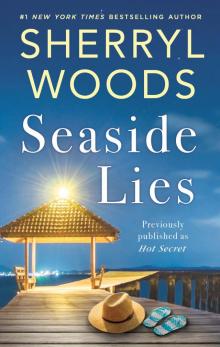 Seaside Lies
Seaside Lies One Last Chance
One Last Chance West Texas Nights
West Texas Nights Wildflower Ridge
Wildflower Ridge In Too Deep
In Too Deep Driftwood Cottage
Driftwood Cottage Heartland
Heartland Kate's Vow (Vows)
Kate's Vow (Vows) Do you take this rebel?
Do you take this rebel? Swan Point
Swan Point A Christmas Blessing
A Christmas Blessing Sweet Tea at Sunrise
Sweet Tea at Sunrise Safe Harbor: A Cold Creek Homecoming
Safe Harbor: A Cold Creek Homecoming Honor
Honor What's Cooking?
What's Cooking? Seaview Inn
Seaview Inn The Cowboy and the New Year's Baby
The Cowboy and the New Year's Baby My Dearest Cal
My Dearest Cal The Calamity Janes
The Calamity Janes A Daring Vow (Vows)
A Daring Vow (Vows) Isn't It Rich?
Isn't It Rich? A Slice of Heaven
A Slice of Heaven Carolina Christmas
Carolina Christmas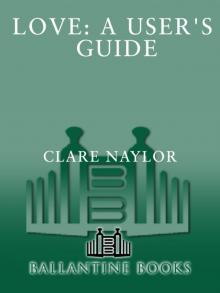 Love
Love Flamingo Diner
Flamingo Diner Courting the Enemy
Courting the Enemy Home at Rose Cottage
Home at Rose Cottage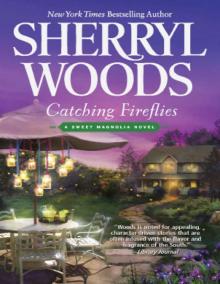 Catching Fireflies
Catching Fireflies Flowers on Main
Flowers on Main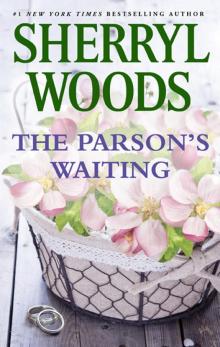 The Parson's Waiting
The Parson's Waiting To Catch a Thief
To Catch a Thief Welcome to Serenity
Welcome to Serenity Daniel's Desire
Daniel's Desire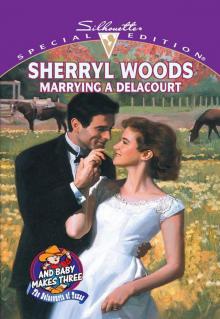 Marrying a Delacourt
Marrying a Delacourt After Tex
After Tex The Unclaimed Baby
The Unclaimed Baby A Chesapeake Shores Christmas
A Chesapeake Shores Christmas Destiny Unleashed
Destiny Unleashed Millionaires' Destinies
Millionaires' Destinies Mending Fences
Mending Fences Lilac Lane
Lilac Lane Edge of Forever
Edge of Forever Natural Born Trouble
Natural Born Trouble Angel Mine
Angel Mine Dogwood Hill
Dogwood Hill Willow Brook Road
Willow Brook Road Moonlight Cove
Moonlight Cove A Vow to Love
A Vow to Love One Step Away: Once Upon a Proposal
One Step Away: Once Upon a Proposal Harbor Lights
Harbor Lights The Cowboy and His Baby
The Cowboy and His Baby A Small Town Love Story--Colonial Beach, Virginia
A Small Town Love Story--Colonial Beach, Virginia Michael's Discovery
Michael's Discovery An O’Brien Family Christmas
An O’Brien Family Christmas The Laws of Attraction
The Laws of Attraction Yesterday's Love
Yesterday's Love Along Came Trouble
Along Came Trouble Dream Mender
Dream Mender Waking Up in Charleston
Waking Up in Charleston The Christmas Bouquet
The Christmas Bouquet The Bridal Path: Danielle
The Bridal Path: Danielle Next Time...Forever
Next Time...Forever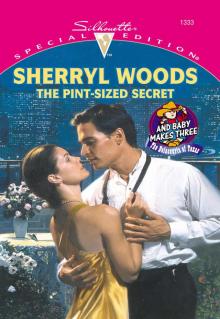 The Pint-Sized Secret
The Pint-Sized Secret Feels Like Family
Feels Like Family A Bridge to Dreams
A Bridge to Dreams The Summer Garden
The Summer Garden Home in Carolina
Home in Carolina Ryan's Place
Ryan's Place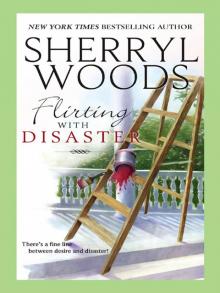 Flirting with Disaster
Flirting with Disaster Cherish
Cherish The Valentine Wedding Dress
The Valentine Wedding Dress More Than Words, Where Dreams Begin: Black Tie and PromisesSafely HomeDaffodils in Spring
More Than Words, Where Dreams Begin: Black Tie and PromisesSafely HomeDaffodils in Spring Natural Born Lawman
Natural Born Lawman Wrangling the Redhead
Wrangling the Redhead Can't Say No
Can't Say No Where Azaleas Bloom
Where Azaleas Bloom Hot Property
Hot Property The Backup Plan
The Backup Plan Riley's Sleeping Beauty
Riley's Sleeping Beauty Hot Secret
Hot Secret Stealing Home
Stealing Home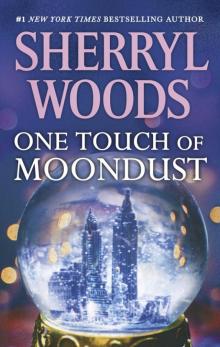 One Touch of Moondust
One Touch of Moondust Miss Liz's Passion
Miss Liz's Passion Hot Money
Hot Money Three Down the Aisle
Three Down the Aisle Tea and Destiny
Tea and Destiny The Rancher and His Unexpected Daughter
The Rancher and His Unexpected Daughter The Inn at Eagle Point
The Inn at Eagle Point Not at Eight, Darling
Not at Eight, Darling For the Love of Pete
For the Love of Pete Ask Anyone
Ask Anyone Finally a Bride
Finally a Bride Dylan and the Baby Doctor
Dylan and the Baby Doctor The Bridal Path: Sara
The Bridal Path: Sara Treasured
Treasured Amazing Gracie
Amazing Gracie Beach Lane
Beach Lane Return to Rose Cottage
Return to Rose Cottage Sean's Reckoning
Sean's Reckoning Joshua and the Cowgirl
Joshua and the Cowgirl Hot Schemes
Hot Schemes The Bridal Path: Ashley
The Bridal Path: Ashley A Love Beyond Words
A Love Beyond Words Sand Castle Bay
Sand Castle Bay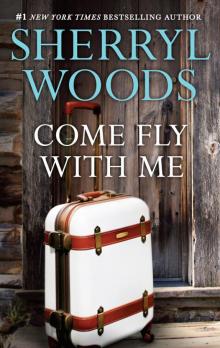 Come Fly with Me
Come Fly with Me Honeysuckle Summer
Honeysuckle Summer The Delacourt Scandal
The Delacourt Scandal Patrick's Destiny
Patrick's Destiny About That Man
About That Man